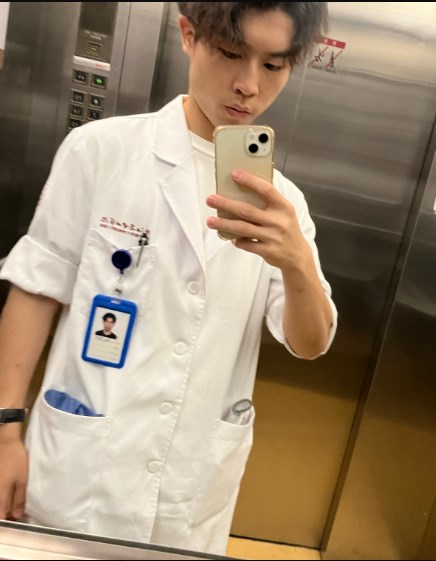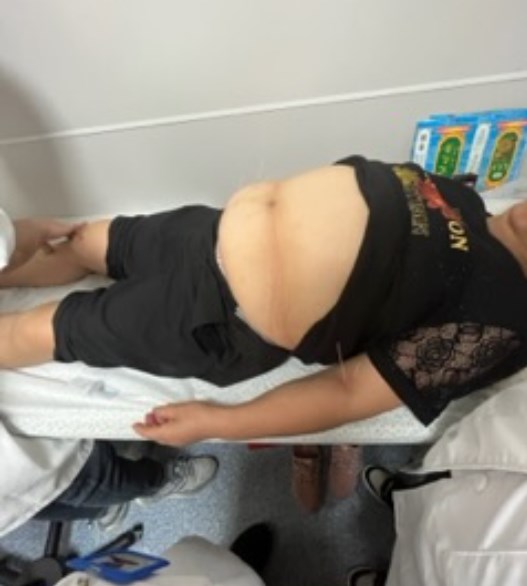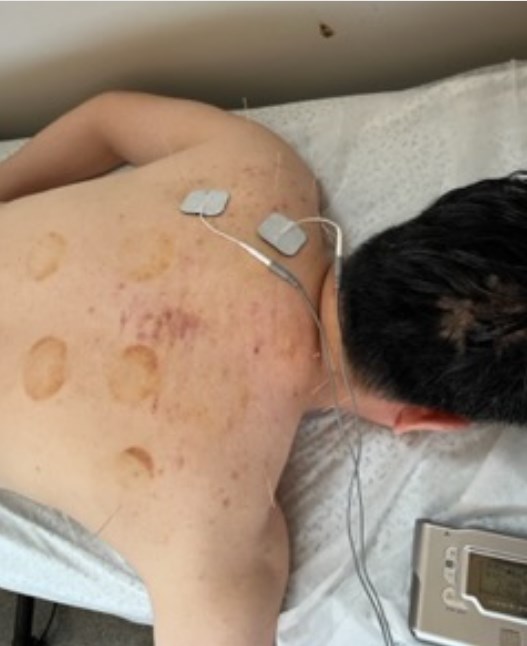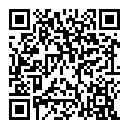泽田阳太SAWADA HARUTA
国籍Nationality: 日本 班级:2019级针灸学201919210202102 实习医院Internship hospital: 浙江省中山医院 Zhongshan Hospital of Zhejiang Province 5. 学习体会 在日本,一般针灸治疗以疼痛疾病为主,但是我来中国以后,看到实习所在科室有很多病种:耳鸣耳聋,腰痛、颈椎病、肩周炎、面瘫、中风后遗症、失眠、膝盖痛等等。现在耳鸣耳聋的人越来越多,我很好奇原因。 我们提出的问题,老师解释得让我们容易明白。我们在日本学校学习的针推知识,我感觉更多是为了让我们通过国家考试,所以我们没有学过电针的波区别。通过在中国的实习,我学会了电针的用法,了解到面瘫急性期、恢复期,腰扭伤时,中风急性期、后遗症时,慢性疼痛等等都有最适合的波。 In Japan, acupuncture treatment is generally based on pain diseases. After I came to China, I saw a lot of diseases in the department where I worked: tinnitus and deafness, low back pain, cervical spondylosis, shoulder periarthritis, facial paralysis, stroke sequelae, insomnia, knee pain and so on. There are more and more people with tinnitus and deafness, and I wonder why. 在针灸科的实习已经过了一个多月,虽然我还不能完全听懂中文,但我尽量跟老师、中国同学和病人沟通交流。刚来门诊的时候,感觉大家有点冷淡,但是时间久了以后,我知道大家都很友善。我尤其喜欢跟病人聊天,他们从不一样的地方来,有不一样的疾病。 虽然我有时听错他们说的事情,但是他们并不生气,还是愿意跟我交流,所以我才能学到很多针灸以外的知识。 将来我想成为一名能和病人用心交流的针灸师,并可以给出健康生活方式的建议。即使非常忙,治疗也不能偷工减料,我在实习科室看到很多医生是真正为病人着想的。我感觉选择到中国来继续针灸推拿的学习是一个正确的决定,现在我和老师、同学们的关系都很好。接下去还有十个多月时间,我要好好考虑毕业后做什么,比如在这里继续攻读研究生。 It has been more than a month since my internship in the department of acupuncture and moxibustion. Although I still can't fully understand Chinese, I try my best to communicate with doctors, Chinese classmates and patients. When I first came to the clinic I felt that everyone was a little cold, but after some time, I've came to know that everyone is very friendly. I especially enjoy talking to patients who come from different places and have different diseases. Sometimes I misunderstand what they say,but they are not angry and still willing to communicate with me, so I can learn a lot besides acupuncture. 对低年级学生的建议 从日本来的学生通常不会说英文,所以在学校里遇到其他国家的留学生时不能交流,他们会有孤立感。如果会踢足球、打羽毛球的话,就有跟不同国家学生一起交流的机会。所以建议大家要有一项运动爱好或者其他的特长。 Usually Japanese students don't speak English, so when they meet students from other countries, they can't communicate and feel isolated. If you can play football or badminton, you will have the opportunity to communicate with international students. Therefore, it is recommended that people should have a hobby or other special skills if they plan to study abroad.
Experience of study:*
我观摩了高老师的腹针,用到中脘穴、下脘穴、气海穴、关元穴、商曲穴、阴都穴、滑肉门穴等等。有的老师用董氏奇穴、有的老师用脐针、耳针等等, 这都是我以前想学习的内容,现在看到了觉得很兴奋。 最让我惊讶的是舌针:他住在病房,一看他的舌头就知道了有淤血。舌的刺血我也是第一次看到,在日本是肯定看不到这个治疗方法的。
I watched Dr. Gao's abdominal needle, using Zhongwan, Xiawan, Qihai, Guanyuan, Shangqu, Yindu, Sliumen and so on. Some teachers use Dong's strange points, some teachers use umbilical needles, ear needles, etc., which are what I used to want to learn, and now I feel very excited to see it. The thing that surprised me most was the tongue needle: he was in the ward, and I could tell by looking at his tongue that there was bruising. Tongue puncture blood I also saw for the first time, in Japan you never see this treatment.
The teacher made it easy for us to understand the questions we raised. We learned acupuncture and tuina knowledge in Japanese school, but somehow I feel it's only helping us to pass the national license exam. For example, we did not learn the wave difference of electroacupuncture which we learned during my internship in China. I also got to know that there are the most suitable waves for the acute phase of facial paralysis, the recovery phase, the lumbar sprain, the acute phase of stroke, the sequelae, and chronic pain.
In the future, I want to be an acupuncturist who can communicate with patients and give advice on healthy lifestyle. I saw a lot of Chinese doctors who really care for the patients. I'm sure I've made a right decision to continue my study of acupuncture and tuina in China. Now I have good relationship with my teachers and classmates. In the next
10 months, I have to think about what to do after graduation, for example starting postgraduate program in ZCMU.
Advice for junior students:*
国际教育学院或者其他部门组织的活动,比如国际文化节、音乐会等, 我们要积极参加,这样可以增加和中国以及其他国家学生的沟通交流机会。
计划准备去中国的日本学生,务必在日本认真地学习中文和英文,这样来中国之后交流沟通的障碍会小很多。
We should actively participate in the activities organized by IEC or other departments such as international cultural festival or concert, which surely increase the opportunities of meeting students from China and other countries.
To decrease the communication barrier, Japanese students who plan to go to China must study Chinese and English carefully in Japan.


